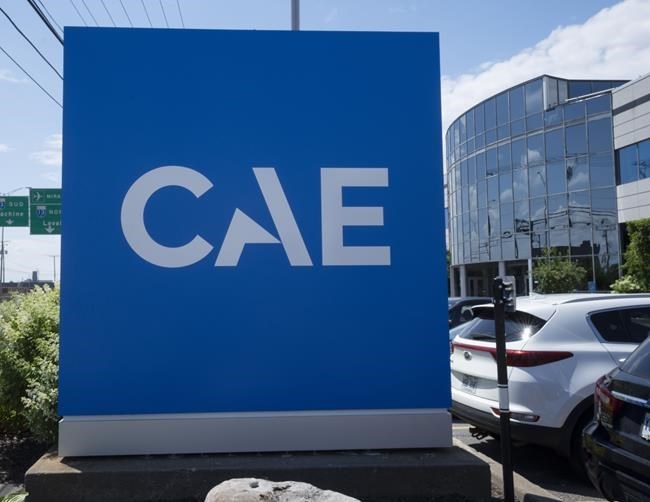MONTREAL ŌĆö CAE Inc. continued to ride the tailwinds of a resurgence of commercial air travel last quarter, boosting its profits by 31 per cent year over year.
CEO Marc Parent said Tuesday that the flight simulator maker's double-digit growth in revenues and net income was driven mainly by strong momentum in civil aviation as well as by higher sales in its other main segment, defence.
The Montreal-based company also increased its backlog to a record $11.8 billion in the quarter ended Sept. 30, up by $1.2 billion or 11 per cent from a year earlier. The sales included 15 civil flight simulators ŌĆö eight of them to Irish budget carrier Ryanair for the Boeing 737 Max jetliner ŌĆö and simulation-based training for the U.S. army's latest airborne intelligence, surveillance and reconnaissance system.
Parent stressed short-term demand for flight simulators at airlines as they scramble to train pilots as well as longer-term defence needs fuelled by unstable international relations.
"Churn ŌĆö pilots moving on either from narrow-bodies to wide-bodies or co-pilot to pilot ... anything like that triggers demand for training. And I can tell you there's a lot of unmet demand out there, both in commercial aviation and business aviation," Parent told analysts on a conference call Tuesday.
In a release, he also said the defence sector is in "the early stages of an extended up-cycle, driven by an increased focus on near-peer threats, greater commitments by governments to defence modernization and readiness in context of geopolitical events."
The company added that a fatter profit margin in its defence segment is now expected in the next fiscal year, rather than this year as previously forecasted.
Fallout from upheaval in the U.S. Congress has reached CAE, taking a toll on its defence profits.
"We see incremental risks in defence related to ... the budgetary issues that we see in the United States," Parent said. He added that some "newer and higher-margin" programs hinge on the passage of legislation that has been snarled by impasses in Congress.
National Bank analyst Cameron Doerksen viewed the company's overall quarterly results as "mixed."
"On the one hand, we are encouraged by the stronger than previously expected performance in the civil segment," he said in a note to investors, adding that the market remains promising in coming years.
"On the other hand, the weak margin performance in defence has been an investor focus for the last two years, so CAE's indication that the market will have to wait even longer to see a positive inflection in margins until sometime in 2025 is a clear disappointment."
Last month, CAE announced a deal to sell its health-care business to U.S. company Madison Industries for $311 million. The segment, which accounted for less than four per cent of the company's earnings last quarter, focuses on training for medical professionals via patient simulators.
On Tuesday, CAE reported net income attributable to equity holders of $58.4 million or 18 cents per share in its second quarter. The result marked a big jump from profits of $44.5 million or 14 cents per diluted share in the same quarter last year.
Revenue for the three-month period rose 10 per cent to $1.09 billion from $993.2 million.
On an adjusted basis, CAE earned 27 cents per share, up from an adjusted profit of 19 cents per share a year earlier and beating analyst expectations of 20 cents per share, according to financial markets data firm Refinitiv.
This report by The Canadian Press was first published Nov. 14, 2023.
Companies in this story: (TSX:CAE)
Christopher Reynolds, The Canadian Press



